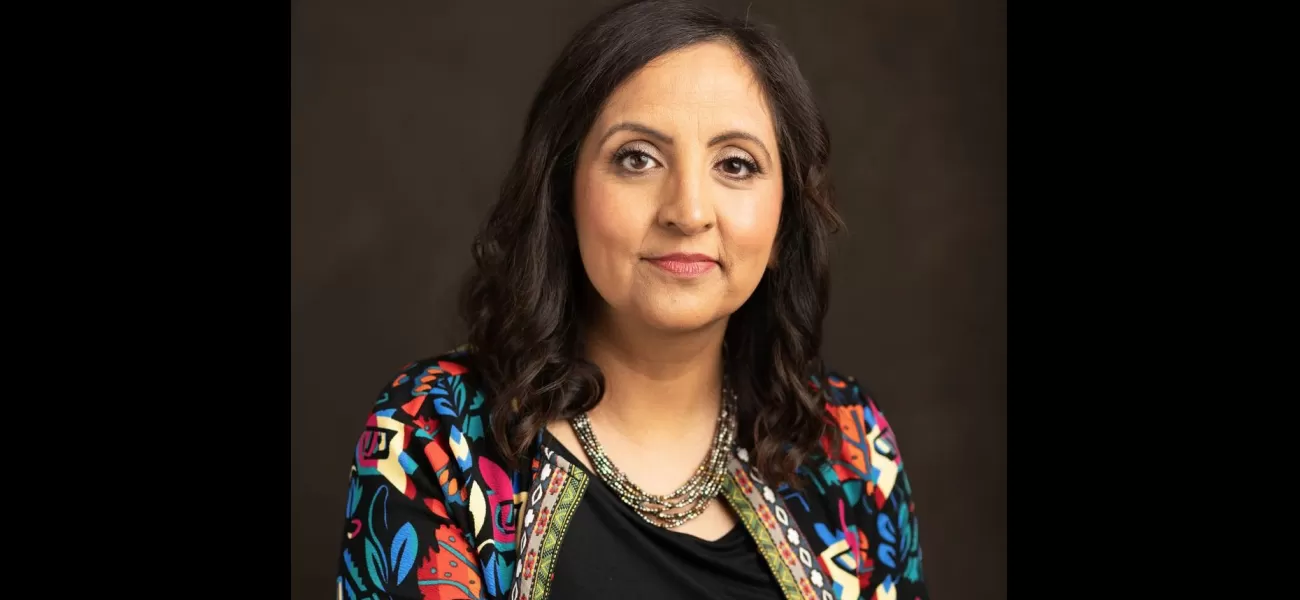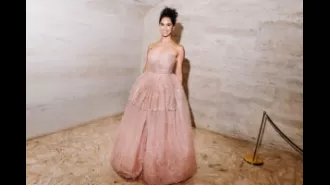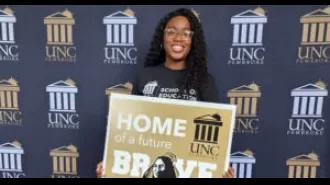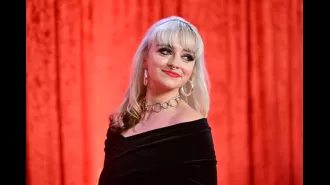My friend noticed my changed hair but I couldn't bring myself to explain the reason.
Telling my parents was even more difficult than hearing it myself.
April 27th 2024.

As I sat sipping my drink at the wedding, surrounded by my family and friends, I couldn't help but feel a sense of unease. Weddings were always such joyous occasions, but today, I felt like I was on edge. As I looked around at the huddles of people chatting and laughing, I realized that hardly anyone knew what I was going through.
A family friend approached me, beaming with a warm smile. "So lovely to see you, Bep," she said. "Your hair looks different." I self-consciously gave it a pat, then forced a smile. "How are you?" I replied smoothly, hoping to hide the turmoil I was feeling inside.
After a few minutes of conversation, she drifted off into the crowds and I breathed a sigh of relief. It was no surprise that my hair looked different - I was undergoing chemotherapy and had lost most of my real hair. I was wearing a wig, but I didn't want to tell anyone at the wedding. In fact, hardly anyone knew about my battle with cancer.
Being a Sikh from a family of Indian descent, there was a huge stigma surrounding cancer. It was not something that was openly talked about - even by myself, at the time. It was during a holiday in Cornwall with my husband when I first discovered a lump in my left breast in early 2013. I wasn't too worried at first, as I had experienced lumpy breasts before and never thought it could be something serious.
But upon returning home, my doctor sent me to the breast clinic for further tests. It turned out that the lump was indeed sinister - I had triple negative grade 3 invasive ductal breast cancer. This meant that the cancer had started in my milk ducts and had spread to surrounding tissues. And to make matters worse, it was growing rapidly.
I felt numb as the doctor explained my diagnosis. I could barely concentrate and could barely hear her words. I couldn't believe it - I had cancer. I needed some time to process this news before telling my family, especially because of the stigma surrounding cancer in my community.
In the South Asian community, success is often measured by material possessions, a good job, a spouse, and children. Cancer, or any illness that could disrupt this image, was something to be feared and not spoken about. It was almost as if by not talking about it, we could pretend it didn't exist.
But now, it had happened to me. I struggled to come to terms with my diagnosis, and I didn't want to deal with people's judgment or pity while I was still trying to come to terms with it myself. After my lumpectomy, I finally mustered the courage to tell my parents and siblings. It was even harder to say the words out loud to them than it had been to hear them myself. My mother, who had also battled cancer, went into practical mode, asking about my treatment plan. My father was more emotional.
After that, I kept the news mostly to myself. I told my workplace that I needed to take a year off, giving them minimal details, and only a few close friends knew when I felt ready to share. The treatment was tough - six cycles of chemotherapy and radiotherapy. I was afraid of the toll it would take on my body, and I didn't want my illness to become visible. But during my first chemotherapy session, I met an older lady wearing a fedora hat and a beautiful scarf. She told me that this was her sixth session and that I could get through it too. Her words gave me the strength and courage I needed to face the battle ahead.
As I went through the grueling treatment, I struggled with the fact that so few people knew about my cancer. I also wanted to protect my family from my darkest thoughts, so I only confided in my therapist. "What if the treatment doesn't work?" I asked her. "What if I die?" But thankfully, after a course of radiotherapy, I was declared cancer-free in January 2014. It was incredible news, but as I left the hospital, I felt like a completely different person. I had gone through something life-changing, and I was now starting a new chapter in my life.
Returning to work was difficult. Although my manager was understanding and informed my team about my absence, I still felt uncomfortable, and it seemed like others did too. People would avoid me or cross the corridor when I made a cup of tea. I confided in a friend, expressing my frustrations. "I know you want to keep a lot of this to yourself," she replied, "but I wish you knew how many people love you. What if, by talking about it, you could help someone else going through this?"
Her words struck a chord with me. As a Sikh, it is ingrained in our belief system to help others. And I thought about how the lady in chemotherapy, with just a few words, had inspired me. And how much better it had felt to open up to my therapist. If sharing my experience could have such an impact, then I wanted to speak out about it.
That's how I ended up giving talks at a Macmillan Cancer Support Conference, not just about my own journey, but also about the importance of speaking openly about cancer. I wanted to spread awareness about the signs and symptoms of different types of cancer and the importance of seeking support after a diagnosis. And later, when I was diagnosed with endometrial cancer in 2019 and bowel cancer in 2022, I knew I needed to tell people. I no longer felt ashamed or fearful of judgment because of my diagnosis. I wanted their support, and they needed to know what was happening to me to give me that help.
Some people didn't know how to react, and it was awkward and uncomfortable. Some even stopped speaking to me, which broke my heart. But others rallied around me, offering practical and emotional support whenever I needed it. Fortunately, my treatments were successful, and I am now cancer-free. I am currently being tested for Lynch syndrome, an inherited condition that increases the risk of developing certain cancers. This is another reason why it's important to talk about cancer in families, as early detection can help prevent recurrence.
I will talk about cancer to anyone who will listen. I've given talks to scientists, medical staff, and even children. It's crucial that we break the taboo surrounding cancer - there is no shame in it. To anyone who has been diagnosed with cancer, I'm sorry. It really sucks. But don't let fear or stigma stop you from reaching out for help. Please, don't face cancer alone.
A family friend approached me, beaming with a warm smile. "So lovely to see you, Bep," she said. "Your hair looks different." I self-consciously gave it a pat, then forced a smile. "How are you?" I replied smoothly, hoping to hide the turmoil I was feeling inside.
After a few minutes of conversation, she drifted off into the crowds and I breathed a sigh of relief. It was no surprise that my hair looked different - I was undergoing chemotherapy and had lost most of my real hair. I was wearing a wig, but I didn't want to tell anyone at the wedding. In fact, hardly anyone knew about my battle with cancer.
Being a Sikh from a family of Indian descent, there was a huge stigma surrounding cancer. It was not something that was openly talked about - even by myself, at the time. It was during a holiday in Cornwall with my husband when I first discovered a lump in my left breast in early 2013. I wasn't too worried at first, as I had experienced lumpy breasts before and never thought it could be something serious.
But upon returning home, my doctor sent me to the breast clinic for further tests. It turned out that the lump was indeed sinister - I had triple negative grade 3 invasive ductal breast cancer. This meant that the cancer had started in my milk ducts and had spread to surrounding tissues. And to make matters worse, it was growing rapidly.
I felt numb as the doctor explained my diagnosis. I could barely concentrate and could barely hear her words. I couldn't believe it - I had cancer. I needed some time to process this news before telling my family, especially because of the stigma surrounding cancer in my community.
In the South Asian community, success is often measured by material possessions, a good job, a spouse, and children. Cancer, or any illness that could disrupt this image, was something to be feared and not spoken about. It was almost as if by not talking about it, we could pretend it didn't exist.
But now, it had happened to me. I struggled to come to terms with my diagnosis, and I didn't want to deal with people's judgment or pity while I was still trying to come to terms with it myself. After my lumpectomy, I finally mustered the courage to tell my parents and siblings. It was even harder to say the words out loud to them than it had been to hear them myself. My mother, who had also battled cancer, went into practical mode, asking about my treatment plan. My father was more emotional.
After that, I kept the news mostly to myself. I told my workplace that I needed to take a year off, giving them minimal details, and only a few close friends knew when I felt ready to share. The treatment was tough - six cycles of chemotherapy and radiotherapy. I was afraid of the toll it would take on my body, and I didn't want my illness to become visible. But during my first chemotherapy session, I met an older lady wearing a fedora hat and a beautiful scarf. She told me that this was her sixth session and that I could get through it too. Her words gave me the strength and courage I needed to face the battle ahead.
As I went through the grueling treatment, I struggled with the fact that so few people knew about my cancer. I also wanted to protect my family from my darkest thoughts, so I only confided in my therapist. "What if the treatment doesn't work?" I asked her. "What if I die?" But thankfully, after a course of radiotherapy, I was declared cancer-free in January 2014. It was incredible news, but as I left the hospital, I felt like a completely different person. I had gone through something life-changing, and I was now starting a new chapter in my life.
Returning to work was difficult. Although my manager was understanding and informed my team about my absence, I still felt uncomfortable, and it seemed like others did too. People would avoid me or cross the corridor when I made a cup of tea. I confided in a friend, expressing my frustrations. "I know you want to keep a lot of this to yourself," she replied, "but I wish you knew how many people love you. What if, by talking about it, you could help someone else going through this?"
Her words struck a chord with me. As a Sikh, it is ingrained in our belief system to help others. And I thought about how the lady in chemotherapy, with just a few words, had inspired me. And how much better it had felt to open up to my therapist. If sharing my experience could have such an impact, then I wanted to speak out about it.
That's how I ended up giving talks at a Macmillan Cancer Support Conference, not just about my own journey, but also about the importance of speaking openly about cancer. I wanted to spread awareness about the signs and symptoms of different types of cancer and the importance of seeking support after a diagnosis. And later, when I was diagnosed with endometrial cancer in 2019 and bowel cancer in 2022, I knew I needed to tell people. I no longer felt ashamed or fearful of judgment because of my diagnosis. I wanted their support, and they needed to know what was happening to me to give me that help.
Some people didn't know how to react, and it was awkward and uncomfortable. Some even stopped speaking to me, which broke my heart. But others rallied around me, offering practical and emotional support whenever I needed it. Fortunately, my treatments were successful, and I am now cancer-free. I am currently being tested for Lynch syndrome, an inherited condition that increases the risk of developing certain cancers. This is another reason why it's important to talk about cancer in families, as early detection can help prevent recurrence.
I will talk about cancer to anyone who will listen. I've given talks to scientists, medical staff, and even children. It's crucial that we break the taboo surrounding cancer - there is no shame in it. To anyone who has been diagnosed with cancer, I'm sorry. It really sucks. But don't let fear or stigma stop you from reaching out for help. Please, don't face cancer alone.
[This article has been trending online recently and has been generated with AI. Your feed is customized.]
[Generative AI is experimental.]
0
0
Submit Comment





